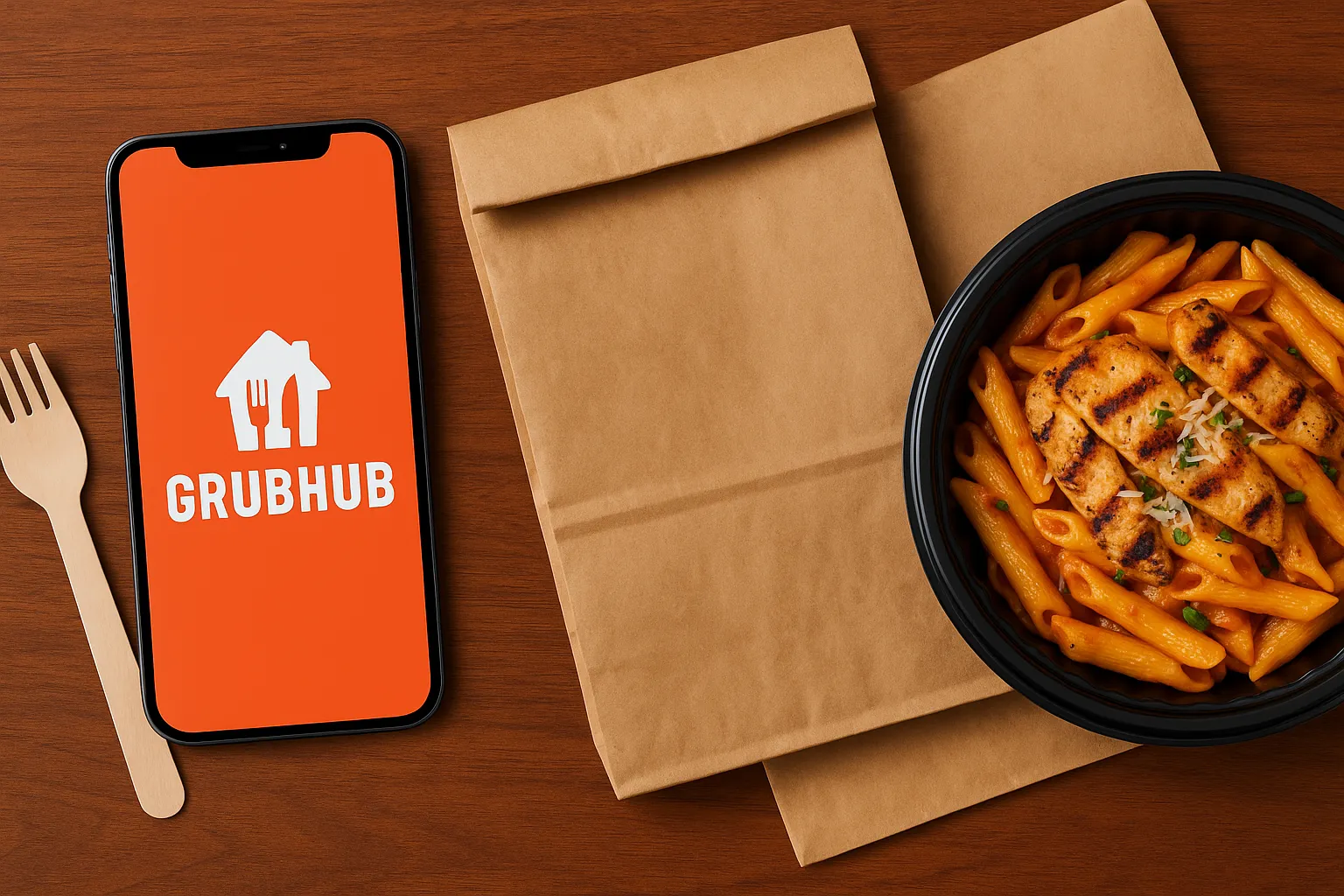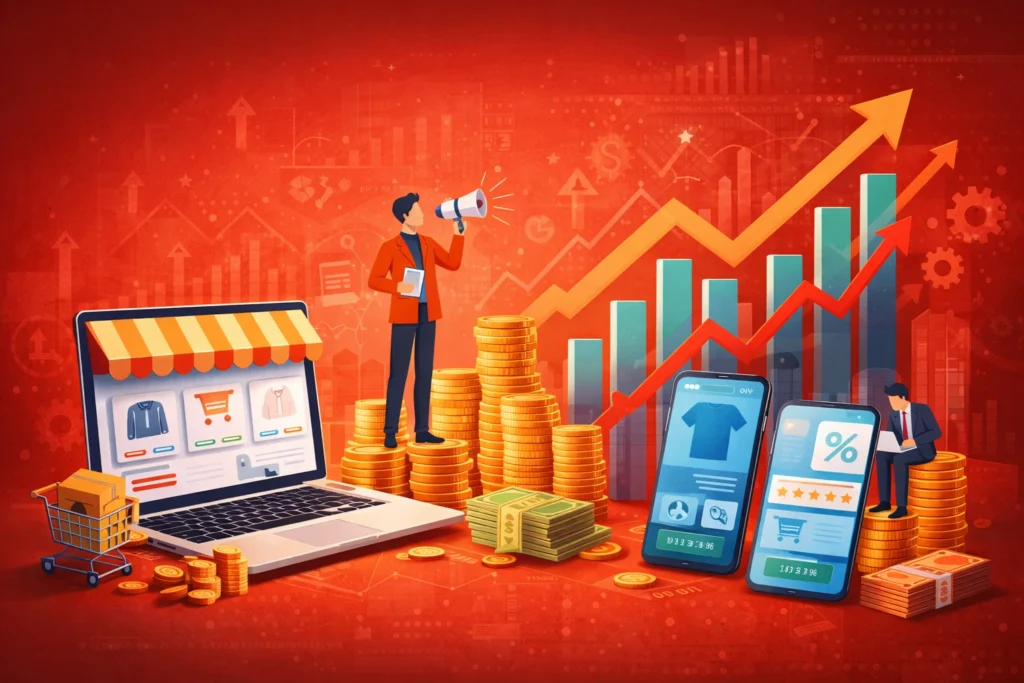Grubhub has become a household name in food delivery. Since its launch in 2004, it has reshaped how people order meals from their favorite restaurants. Today, Grubhub connects millions of hungry customers with restaurants in minutes.
Its business model is worth studying because it perfectly blends technology, partnerships, and customer convenience to generate billions in revenue. If you’re a founder aiming to build an on-demand delivery app, understanding how Grubhub operates can inspire a winning strategy of your own.
What is Grubhub & How It Works
Grubhub is an online food ordering and delivery platform. It solves a simple but powerful problem: getting restaurant meals to customers quickly and conveniently without the need to leave home or the office.
What Problem Does Grubhub Solve?
Before platforms like Grubhub, customers had to call restaurants directly, read menus over the phone, and hope their order was taken correctly. Grubhub eliminates these hassles by offering:
- A single app to browse thousands of restaurants
- Easy online payment
- Real-time order tracking
- Fast delivery through independent drivers
This convenience has turned Grubhub into a preferred solution for busy professionals, students, and families.
Who Uses Grubhub?
Grubhub’s user base includes:
- Individuals ordering meals at home
- Office workers needing lunch delivery
- College students looking for late-night food
- Restaurants wanting to reach more customers
- Delivery drivers earning income on a flexible schedule
How Does Grubhub Operate?
Grubhub runs a three-sided marketplace involving:
- Customers who browse menus and place orders through the app or website.
- Restaurants who list their menus and accept incoming orders.
- Delivery drivers (couriers) who pick up and deliver food.
When an order is placed, Grubhub processes the payment, notifies the restaurant, assigns a driver, and keeps the customer updated until delivery is complete.
Read More : What is Grubhub App and How Does It Work?
Target Audience
Grubhub’s success comes from understanding and serving the needs of several key customer segments. If you’re building a similar app, these are the audiences you’ll want to attract:
- Urban Professionals
People with demanding schedules who prefer to order lunch or dinner rather than cook or dine out. - College Students
Students looking for affordable, fast food deliveries—especially late at night or during study sessions. - Families
Households that want the convenience of ordering meals for the entire family on busy evenings. - Restaurants
Small and medium restaurants that rely on delivery services to expand their customer base and increase revenue. - Corporate Clients
Companies placing group orders for meetings, events, or daily staff lunches. - Independent Delivery Drivers
Gig workers who use the platform to earn income with flexible hours.
Grubhub tailors features, promotions, and partnerships to each of these groups, ensuring high engagement and repeat business.
Features that Support the Business Model
Grubhub’s app is packed with features designed to make ordering food seamless and to drive revenue. Here are the core capabilities that power its business model:
- Restaurant Discovery
A searchable directory with filters for cuisine, ratings, delivery time, and special offers, making it easy for users to find what they crave. - Menu Browsing and Customization
Digital menus allow customers to customize orders, add notes, and see prices upfront. - Integrated Payment Processing
Secure payment options, including credit cards, Apple Pay, and PayPal, reduce friction and ensure quick transactions. - Real-Time Order Tracking
Customers see updates from order confirmation to delivery, increasing transparency and trust. - Loyalty and Rewards Programs
Grubhub Perks offers exclusive discounts, free delivery, and rewards points, boosting retention. - Promotions and Sponsored Listings
Restaurants can pay to appear higher in search results or to offer featured deals, generating advertising revenue. - Delivery Management Tools
A driver app coordinates pick-ups and drop-offs efficiently, ensuring fast delivery times and better customer satisfaction.
These features work together to attract more users, keep them coming back, and create multiple ways for Grubhub to make money.
Read more : Grubhub App Features Explained for Founders
Revenue Streams of Grubhub
Grubhub has built a diverse set of income sources that fuel its growth. Below is a clear breakdown of how Grubhub makes money:
| Revenue Stream | How It Works |
| Delivery Fees | Customers pay a fee per order, often calculated by distance and restaurant partnerships. |
| Commission from Restaurants | Grubhub charges restaurants a percentage (usually 10–30%) of each order total. |
| Subscription Services | Grubhub+ offers unlimited free delivery for a monthly fee, encouraging loyalty. |
| Advertising & Promotions | Restaurants pay for sponsored listings, featured placements, and marketing campaigns. |
| Service Fees | Additional charges applied to each order to cover operational costs and platform maintenance. |
| Corporate Accounts | Businesses pay fees for catering and group orders with specialized invoicing and support. |
| Driver Tips (Passed Through) | While tips go to drivers, Grubhub facilitates this process as part of the transaction. |
Highlights of Each Stream
- Delivery Fees
Range from $0.99 to $5.99+ depending on location and promotions. - Restaurant Commissions
The biggest driver of revenue—restaurants pay a cut for each sale generated through Grubhub. - Grubhub+ Subscription
Users pay ~$9.99/month for unlimited free delivery from select restaurants. - Advertising
Restaurants boost visibility with paid promotions in the app and email campaigns. - Service Fees
A small percentage added to cover payment processing and platform upkeep. - Corporate Accounts
Grubhub offers tailored services to businesses for regular group orders.
These combined streams allow Grubhub to maintain healthy margins while scaling operations.
Read more : Revenue Model of Grubhub: How the Food Delivery Giant Makes Money
Cost Structure
Running a large-scale delivery platform like Grubhub comes with significant operating costs. Here are the main expenses involved:
- Driver Payments
Compensation and incentives paid to delivery drivers per completed order. - Technology and Platform Maintenance
Continuous development of the app, website, APIs, and backend infrastructure. - Customer Support
24/7 support teams handling order issues, refunds, and driver coordination. - Marketing and Promotions
Ongoing investment in digital ads, referral programs, and restaurant partnerships. - Payment Processing Fees
Costs for handling credit card transactions and payment gateway services. - Insurance and Liability
Coverage for drivers and orders in case of accidents, theft, or damage. - Administrative and Legal
General overhead, compliance costs, and legal services to operate in multiple regions.
Why This Matters for Founders
If you plan to launch a similar platform, expect substantial upfront and recurring costs. Efficient logistics and automation are crucial to protect margins.
2024–2025 Innovations or Updates
Grubhub continues to evolve its business model to stay competitive and meet rising customer expectations. Here are some of the most notable updates and innovations shaping the platform in 2024–2025:
- Expanded Grubhub+ Perks
Grubhub has enhanced its subscription program by including exclusive discounts at more partner restaurants, free delivery on larger orders, and priority customer support for members. - AI-Powered Order Forecasting
New machine learning models help predict demand surges, optimize delivery routes, and reduce delivery times during peak hours. - Sustainable Packaging Initiatives
Grubhub has partnered with select restaurants to offer eco-friendly packaging options, appealing to environmentally conscious consumers. - In-App Restaurant Loyalty Programs
Customers can now earn restaurant-specific rewards and redeem them directly within Grubhub, deepening restaurant partnerships. - Expanded Catering and Group Orders
Grubhub has rolled out improved tools for businesses to schedule and manage large orders, strengthening its corporate revenue stream. - Enhanced Driver Support Features
New driver app updates offer better route optimization, earnings insights, and safety tools.
These innovations help Grubhub improve customer retention, increase order volume, and diversify its income sources.
Takeaways for Startup Founders
Studying Grubhub’s business model offers powerful lessons for any founder considering an on-demand delivery platform. Here are key insights you can apply to your own venture:
- Diversify Your Revenue
Don’t rely solely on delivery fees—combine commissions, subscriptions, and advertising to strengthen your margins. - Invest in User Experience
Grubhub’s success comes from intuitive ordering, reliable delivery, and real-time tracking. Simplicity wins. - Prioritize Partnerships
Building strong relationships with restaurants and offering them marketing tools helps drive more orders and loyalty. - Leverage Data and AI
Use data analytics to predict demand, improve logistics, and create personalized promotions. - Offer Subscription Benefits
A subscription model like Grubhub+ generates recurring revenue and increases customer stickiness. - Plan for Scale Early
The operational complexity grows fast. Automate logistics and customer support to handle growth smoothly.
Read more : Grubhub Marketing Secrets for Startups
Why Build with Miracuves
At Miracuves, we help startup founders launch apps inspired by Grubhub—fast. Our ready-made Grubhub solutions give you:
A proven, scalable architecture
Custom branding and feature extensions
Advanced driver and restaurant management tools
Secure payment processing integration
Ongoing technical support and updates
If you’re ready to enter the booming food delivery market, we’ll help you get there faster and more cost-effectively than building from scratch.
Read more : How to Build an App Like Grubhub: Full Developer Guide for Startups & Tech Teams
Conclusion :
Grubhub’s business model shows how combining technology, partnerships, and smart monetization can transform how people order food. From delivery fees to advertising and subscriptions, Grubhub has built multiple revenue streams that keep the platform profitable and growing.If you’re an entrepreneur inspired by Grubhub’s success, there’s never been a better time to launch your own delivery app. With Miracuves, you don’t have to start from zero. Our Grubhub solutions give you a proven foundation, fully customizable features, and the expertise to help you succeed.
Ready to build your own on-demand food delivery platform?
Explore our Grubhub Solutions or Contact Us to get started today
FAQs :
1. How does Grubhub make money from restaurants?
Grubhub charges restaurants a commission on each order placed through the platform. This typically ranges from 10–30% of the order total, depending on the partnership level and promotional services the restaurant uses.
2. Is Grubhub profitable?
Grubhub has historically operated on thin margins due to intense competition and logistics costs. However, its combination of commissions, delivery fees, advertising, and subscription revenue helps balance profitability over time.
3. What is Grubhub+?
Grubhub+ is a subscription program that offers unlimited free delivery from eligible restaurants and exclusive discounts for a monthly fee. This model increases customer loyalty and generates recurring revenue.
4. How does Grubhub compete with other food delivery apps?
Grubhub competes by offering: A wide network of restaurants ,Strong corporate ordering solutions ,Loyalty perks and subscriptions , Marketing tools for restaurants These differentiators help retain customers despite aggressive competition.
5. Can I build a similar app without huge funding?
Yes. While Grubhub has invested hundreds of millions in development and marketing, you can launch a smaller-scale version using ready-made solutions like the Grubhub Clone from Miracuves. This saves time and budget while giving you a strong foundation to scale.
Related Articles :
- How to Develop a Food & Grocery Delivery App Like Glovo: Costs, Features, and Timeframe
- Create a Food Delivery App Like Swiggy: Key Features, Cost, and Development Process
- Build a Food Delivery App Like ChowNow: Business Model, Features, and Costs
- How to Make a Food Delivery App Like Deliveroo: Features, Costs, and Technology








